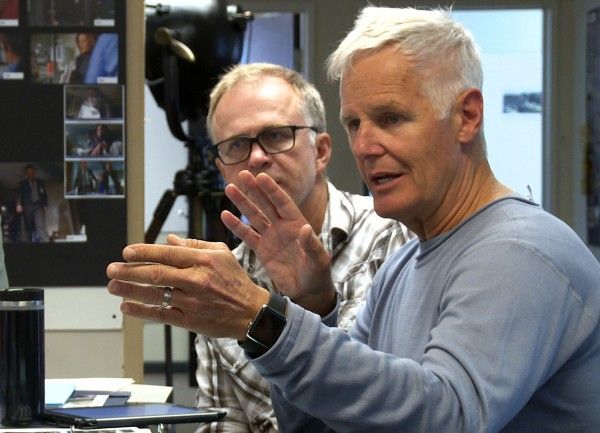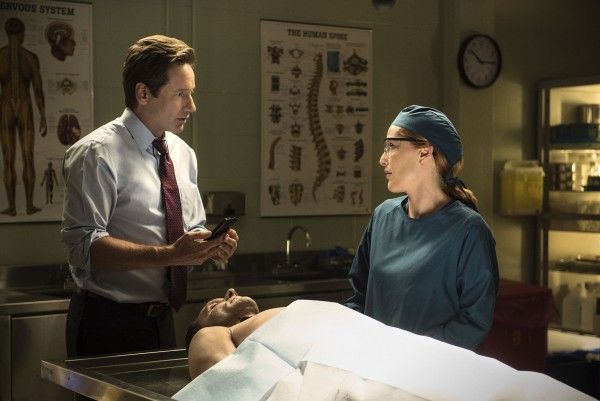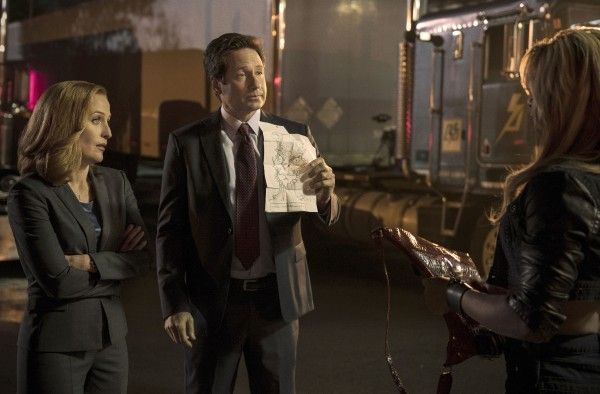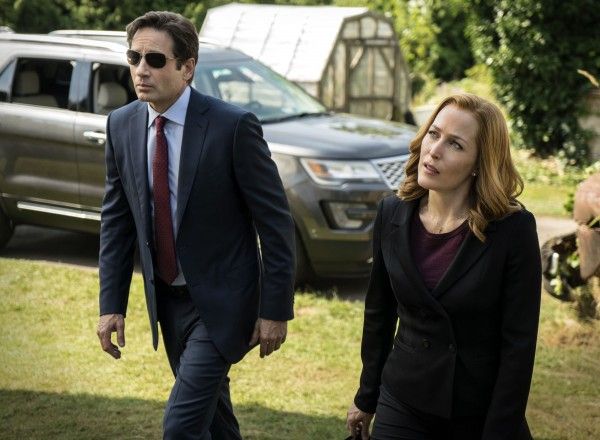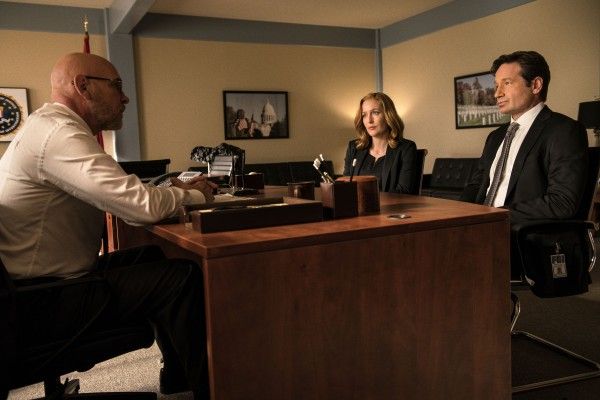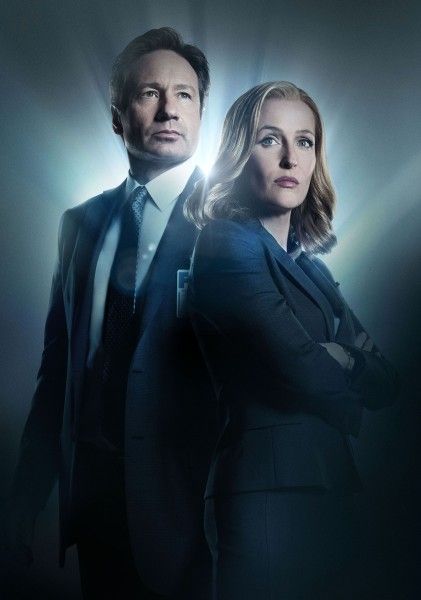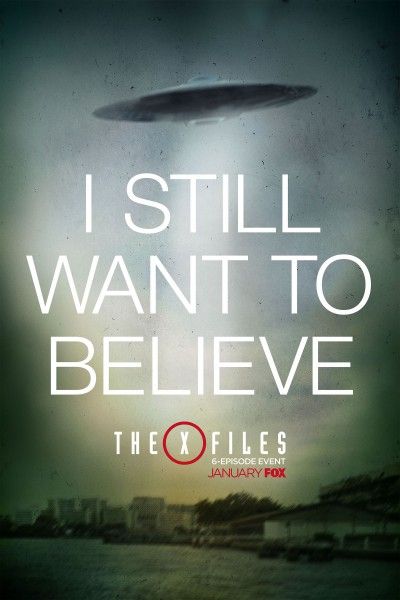Thirteen years after the original series run, the Fox series The X-Files is back as a six-episode event series from creator/executive producer Chris Carter. With David Duchovny and Gillian Anderson re-inhabiting their roles as iconic FBI Agents Fox Mulder and Dana Scully, and Mitch Pileggi back as FBI Assistant Director Walter Skinner, the event series will encompass a mixture of stand-alone episodes, both funny and scary, and those that further the original show’s seminal mythology.
While at the TCA Press Tour, Chris Carter participated in a small roundtable with Collider (along with three other press outlets) where he talked about reassembling the writers room, whether he ever considered bringing on any new writers, how familiar it felt to return to the show, the structure of the season, why The X-Files is suited for both TV and film, managing fan expectations, having the luxury of time to finish the effects, why he keeps returning to this world, and what he hopes fans take away from these episodes. Be aware that there are some spoilers.
Question: You brought back a lot of the writers from the original series to help you out. What made these guys the right guys to bring back?
CHRIS CARTER: I reached out to Frank Spotnitz and Vince Gilligan, but the first people that I reached out to were the people who were on the show, originally, which were Glen [Morgan] and Jim [Wong] and Darin [Morgan]. I didn’t reach out to Howard [Gordon] because I knew he was busy. He had Tyrant on the air and had an overall deal with Fox, where I knew he was in development. And I didn’t reach out to Alex [Gansa] because he’s got Homeland on the air. But, these other guys were in between jobs. Frank couldn’t do it because he was on The Man in the High Castle. He’s actually got a European series too, so he’s got two series on the air. I actually had lunch with Vince to try to convince him to do it, but he has Better Call Saul and he was very apologetic. He was sorry that he couldn’t be a part of it, but I understood.
When you were originally recruiting writers for the show, how did you end up putting this team together?
CARTER: I got lucky that Peter Roth recommended Morgan and Wong. He had worked with them closely and thought they were right for the show and the genre, and he was absolutely right. That was a stroke of luck. Howard and Alex were writers that had come to me on the recommendation of a friend. I saw their talent and recruited them in another stroke of luck. It was recommended that I read one of Vince Gilligan’s scripts, many years before The X-Files. I did and I saw a very particular writing style and attention to such detail that I remembered his name, which is an unforgettable name anyway. During the second season, or maybe even the first season of the show, when I spoke to his agent, who happens to be my cousin by marriage, and heard that Vince was a fan of the show, I immediately had a meeting with him and he agreed to do an episode. That was another stroke of luck. Frank Spotnitz was somebody I had been in a book-reading club with. He had come in and pitched some idea for the show, which I didn’t buy, but I knew he was a smart person because I had spent time with him outside of work, so I brought him onto the show. I keep talking about strokes of luck, but that’s what they were. There was no genius involved. It was really getting very, very lucky.
Did you ever consider bringing in any new writers to see what they’d do with the characters?
CARTER: I think it would have been a mistake because you wanted to build on a promise. If it didn’t work, you’d be sunk because there’s no way to recover. If someone wrote a script and it didn’t work, the clock is always ticking in series television and you don’t have a chance to make a mistake. You have to put it on the page first. You can’t fix it in post, no matter how you rely on your post-production process. If it’s not there to begin with, it’s very hard to manufacture quality.
That being said, if you could have picked one writer to try their hand at an episode of The X-Files, who would it be?
CARTER: Charlie Kaufman and Aaron Sorkin. That would be amazing, wouldn’t it? You could see what other people’s takes on it would be. But of course, those people would never come to the show. That’s a fantasy.
Did anything feel very different, this time around, or did it feel very much the same to be doing The X-Files again?
CARTER: It’s different coming back to the show, after a long period of being off the air, even though we did a second movie. Coming back and doing a series of shows again felt familiar, but because we were only doing six, that was unfamiliar territory for us. I have to say, though, that the whole thing felt really familiar.
With only six episodes, do you feel like you said everything you wanted and needed to say, or did it make you feel like you had many more ideas?
CARTER: I have lots more ideas. I write them down, every day. So, did I get to say everything I wanted to say? No. But, I think we made good on the opportunity that we were given. We’ve told smart, scary, funny, engaging, thrilling stories from Episodes 1 to 6.
You had the experience working with Amazon on The After, and now you’re back on broadcast TV. How are you feeling about broadcast versus the other options out there right now?
CARTER: On Amazon streaming, I got to use foul language. It was permissive, which was nice and freeing. It felt natural. But, I always said that The X-Files worked best on broadcast network television because of the push and pull. Because there were rules and restrictions on what you could see, hear and say, those restrictions actually helped make it the show that it is. I think that that’s home for it. David [Duchovny] once said to me, “How do you think we would do on cable?,” and I said, “I don’t think this is a cable show.” I really think that it’s a network show.
What you do with the first episode feels like you’re almost erasing everything that you’ve done before it?
CARTER: I don’t think it erases it, but it actually calls things into question. It takes a big right turn for the mythology of the show and it puts it into a contemporary context that you couldn’t have gotten to without the 12 or 13 years in between the time we went off the air and now. It’s of its time. Obviously, you couldn’t have done this in 2003.
Why did you ultimately decide to have the first and last episodes be mythology episodes, with the others being monsters-of-the-week stories, instead of another variation?
CARTER: It’s the ratio that we’ve always done, with stand-alones, comedy and mythology. It felt right to bookend it with mythology, have a personal story arc through the four episodes in between, and land back on a mythology episode. It just felt like a winning mix for us.
What did you learn from doing the second movie, knowing that some people weren’t happy with it?
CARTER: Never do a small-budget PG-13 movie in the summertime, among all those giant-budget tentpole movies and hope that you can actually rise above that noise. It’s impossible. It was released at exactly the wrong time. It was trying to do a small-budget, which means a stand-alones story about faith. In that atmosphere, it was a misstep. I still stand by it. I think there’s excellent work in the movie, but it was never marketed properly and it was out at the wrong time. People wanted a big-screen experience, different than the one we gave them.
Given the choice between the two, if you keep telling stories in this world, would you prefer to do another film, or would you like to do another handful of episodes?
CARTER: I like them both. The stories are endless because it’s a science show. Even though we call it a science fiction show, it’s Scully’s show. It all starts with science, and the science fiction is built on that. Every time I open the paper, there’s some new technological event, or some new scientific convention turned on its head. There are all kinds of stories to tell because the world is ever-changing. You can tell them as episodic television stories, which I love, or you can tell them as big tentpole movie ideas, which I love because I love the big screen.
How are you managing fan expectations?
CARTER: You have to be open to it, but at the same time, I heard there were people that were angry at me because I split the characters up. Those fans had different expectations. But I wanted to be honest to where I thought the characters would be in their lives, based on what I feel about them. Those are my expectations. I always listen to what the fans are saying, but I still always do what I feel is right. Am I mindful of expectations? Absolutely! Do I pay careful attention to them? Absolutely! But, do I do what I think will be right as a storyteller? Absolutely! The X-Files rarely answers questions. We always pose them. Mulder is always right, and Scully is seemingly always wrong, but he’s only right to the extent that she’s wrong. Rarely does he end up with cuffs on the bad, evil, supernatural creature.
The second episode opens up Scully and Mulder to where their child might be. Will that come back up again?
CARTER: Yes. It’s really an emotional journey for them. There’s still a question about William’s whereabouts and certainly a question about his importance to them, both emotionally, as their child, and as we move into the sixth episode, the role he might play in their life, going forward.
The date of 2012 was such an important date to the original series. How did you deal with that?
CARTER: I had thought about it. I wrote this third movie, as a study in the characters and in the show. I wanted to keep them fresh in my mind, and that date, 2012, was very much a part of that idea. It’s harkened to in the first episode and in the final mythology episode. You realize the importance of that date, which unless you were a part of Mulder and Scully’s world, you would have missed.
The technology you use to make this show has changed so much, since the first time around. Where did you notice that most?
CARTER: Just imagine when we were doing 22 to 25 episodes a season, and it took us 11 ½ months a year, when we were on Friday nights, originally, we were delivering the show at 2 o’clock in the afternoon on Friday to air at 9 o’clock. We were running with it to the place where they satellite it, and we were always pressed for time. You can only do effects as good as the time and the money allow. We had very little money and we had even less time, so we couldn’t do what I’d call cutting edge effects. It was just impossible. It just wouldn’t allow for it. In this series, we wrapped around September 1st and we finished the six episodes right around Christmastime. That was such a luxury of time. We got to work on those effects and perfect them. And because I have smart people working with me, they were able to budget our time in such a way as to allow us to keep perfecting it. We could go back to the drawing board and say, “This could be better.” I think the effects on the show are as good as they’ve ever been because of that.
Is the spaceship that you built the big eye candy for the season, or is there something else that we should be looking forward to?
CARTER: It wasn’t the most expensive episode. The one that airs as Episode 2 now, which would have been Episode 5, but we changed it because we felt the story arc was more served by the changing of the order, ended up being the most expensive episode. It had the most locations, it used some of the most expensive equipment, and it had a large cast.
The creature in Episode 3 is so fun to watch. Having done so many different monsters and creatures over the years, is it tough to keep coming up with something new?
CARTER: That’s Darin, and that’s the fifth X-Files episode that he’s done. All five of them are classics in my mind. That’s a really personal and idiosynchratic take on the show that works. What’s amazing to me is that you can do that episode on the heels of Episode 2, and then you’ll come right back to a really scary one in Episode 4, and then you’ll get to a poignant one in Episode 5, and then right back to mythology in Episode 6. The show is elastic. It stretches and comes back to shape. It’s a show that does a lot of things well, and it can do them in some kind of cohesive way.
What keeps bringing you back to this show and this world?
CARTER: It just gives a great storytelling opportunity. It gives me a chance to write about what I’m interested in. That, for me, is the miracle of this show. Not just me, but the writers did what they thought was interesting, and everyone came along. Maybe that happens once in a lifetime, where you’re not serving a master and you’re serving your own interests.
What are you most excited about people taking away from these episodes?
CARTER: That’s hard to answer. There’s this trend to reboot shows now, and that word reboot doesn’t sit well with me. It suggests that you have an old computer in the closet and you want to see if you can fire it up again. That’s not what The X-Files is. The X-Files is a show with a tremendous amount of life in it, that took a big 13-year commercial break. I want people to come away thinking, “Wow, this is still a great show, the actors look great, and there are still lots of stories to tell.”
The X-Files returns to Fox on January 24th, and then will air on Monday nights.


